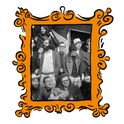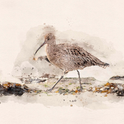The streets of Ballybeg, a small town in County Donegal, Ireland, have a storied past. Its local shop was once the home of Garreth O’Donnell, before he emigrated to America; Molly Sweeney, the blind judge’s daughter, now lives nearby. On the town’s outskirts, amid abandoned cottages and old barns, is a small lounge bar where Frank Hardy once died. Ballybeg Hall, a big house owned by the district justice, sits high above the town, surrounded by fields and salmon streams. Picturesque during the day, children run drunk and screaming through the back-hills on summer nights, starting bonfires and driving cattle through the flames.
Ballybeg is so vividly documented that it can be a surprise to learn that the town is entirely the creation of the late Irish playwright Brian Friel. Over a nearly 50-year career, he set about writing its history and deepening its mythology, from the stories of the families who lived there to the town’s dramatic geography. Though its name comes from the Gaelic “Baile Beag”, meaning small town, it is also, unmistakably, a microcosm for Ireland. Ballybeg’s history is that of the country’s rural, romantic west: it changes from a 19th-century society suffering under English colonialism to an industrialised town afflicted by economic stagnation and famine, before eventually transforming into a thriving, cosmopolitan city in the 21st.
Philadelphia Here I Come!, Friel’s first play from 1964, follows a young man the night before he leaves for America. A dysfunctional family gather in Aristocrats, his play from 1979, after the death of their authoritarian father. Old worlds collapse and families come apart in Friel’s plays, but his characters remain in thrall to Ballybeg, their home. For this reason, comparisons with Chekhov are common, but Beckett too was a clear influence. In the four monologues that make up Faith Healer—which bombed on Broadway in 1979, but is now regarded as his masterpiece—an itinerant faith healer, his wife and his manager tell contradictory stories of their lives, forcing an audience to search for the truth beneath their equivocations, abrupt laughter, meaningful looks and long silences.
Friel set his plays in overgrown gardens, windswept hillsides and falling-down barns, ordinary enough sights in rural Ireland but transformed on stage through atmospheric lighting and poetic, incantatory writing into strange and mysterious landscapes. He thought little of theatre directors, dismissing them as “bus conductors”. The scripts he wrote were, in his words, “a final and complete orchestral score”; everything was exactingly choreographed, from the choice of music—Chopin was a favourite—right down to the movement of the actors on stage: how they cross the room, close their eyes and button up their coats.
The deepening political crisis in Northern Ireland compelled him to co-found, with actor Stephen Rea, the Field Day Theatre Company in 1980. While Friel preferred to avoid the heat of political debate, the Troubles sharpened his conviction that dramatising Irish history could be a way of building common ground. “It is not the literal past, the ‘facts’ of history, that shape us,” says one of the characters in Translations, the company’s inaugural production from 1980, “but images of the past embodied in language.” This 1833-set play, which dealt with the abolition of hedge schools and a brutal British expedition to anglicise local Gaelic place names, toured Ireland and Northern Ireland, earning praise across the divide for its depiction of a forgotten turning point in Irish history.
Friel, however, was happiest out of the limelight. Most of his time was spent an hour’s train ride north of Derry, in the remote fishing village of Greencastle, where he lived in a converted Victorian boarding house with his wife Anne and their five children. Lough Foyle was steps away from his front door. He collected antique clocks and kept bees. Months were spent immersed in research before he sat down at his desk and started to write, slowly, with an HB pencil.
The idea for Dancing at Lughnasa, perhaps his best-known play and currently at London’s National Theatre, came to him suddenly one evening in 1987. While walking past homeless men and women sleeping on the Thames Embankment, Friel recounted to his friend, the playwright Thomas Kilroy, the story of his two aunts, Rose and Agnes. A couple of years before the Second World War, they had suddenly and mysteriously departed their Donegal home and emigrated to London, where even the police had failed to find them. It was only when Friel arrived in the city, more than 25 years later, that he learned what happened to them: after working as cleaners on the Underground, in factories and public toilets, the women had taken to drink and died, young and destitute. Kilroy said Friel should write a play about them.
***
A couple of miles outside the village of Glenties in Donegal is a small, abandoned cottage with cracked windows and a collapsing roof. The little furniture that remains is furred with mould, and there are sudden shafts of light where slates have fallen to the floor and shattered. Inside is an old wireless, a piano, a Lady of Lourdes holy-water bottle and a souvenir plate of the Kennedys, miraculously still clinging to the wall. A modest stone plaque outside proclaims this “The Laurels”.
This was once the home of local stationmaster Barney McLoone, his wife Sarah, and their brood of ten children, which included Friel’s mother, Mary McLoone. Though Friel grew up in Derry, it was here he spent his childhood summers, bilberry-picking and fishing with his four unmarried aunts and his uncle Bernard Joseph MacLoone, a catholic missionary who returned from Nyenga, Uganda, in 1946. In an autobiographical essay from 1973, Friel vividly remembers the look and atmosphere of The Laurels: “the shape of the cups hanging in the scullery, the pattern of flags on the kitchen floor, every knot of wood on the wooden stairway, every door handle, every smell, the shape and texture of every tree.”
Taking place during the summer of 1936, the play Friel wrote was more personal than any he had attempted before, drawing on the memory of his aunts, who become the Mundys, and The Laurels, which he relocated to Ballybeg. A diary entry, dated 31st May 1989, records his excitement: “I suppose the play is about the McLoone family, Fr Barney – and my father. Family life – make-believe – remembering and remaking the past – betrayal – groping towards love. Really original stuff for me!” The rest of the play came quickly, over the course of several months, although Friel’s writing process was fraught with anxiety—hardly surprising for a man usually so private and taciturn that it was once said that trying to capture him was “like shifting smoke with a pitchfork”. And yet, when he completed the play, he made no attempt to conceal its autobiographical roots; the script is dedicated to “those five brave Glenties women.”
First-time audiences will never forget the moment when the Mundy sisters, tired of bread-making and collecting turf, suddenly break into an ecstatic, spontaneous dance around their kitchen towards the end of the play’s first act. An extraordinary coup de theatre in celebration of Lughnasa, the pagan harvest festival that gives the play its title, it expresses more powerfully than words their pent-up loneliness and frustration. Critics have argued the play is about the conflict between Catholicism and Paganism or the threat to rural communities posed by the Industrial Revolution, but the central drama, as expressed by its narrator Michael, concerns the mysterious nature of memory: how it can record the past unfaithfully but nevertheless maintain a powerful, even oppressive, bearing on the present.
The play premiered at the Abbey Theatre, Dublin, in 1990, before transferring to London’s West End and, later, Broadway, where it won Friel his first Tony Award for Best New Play at the age of 62. Eight years later it was adapted into a movie, written by his friend Frank McGuinness and starring Meryl Streep, Kathy Burke and Bríd Brennan. Friel bought himself an antique Georgian clock with his earnings. That, he said, was “more pleasurable than the play itself.”
Kilroy was surprised to find the fate of Rose and Agnes restricted to “a few, potent sentences”. It was as if, in writing the play, Friel was eager to preserve his aunts as he had remembered them: dancing deliriously and full of life. Their fate is deferred to the play’s climax, when Michael walks to the stage’s edge, and, in a single, shattering monologue, narrates the family’s demise: the sisters will depart for London at the end of summer; Uncle Jack will pass away the following year; the lives of the sisters who remain in Ballybeg will be shadowed by loss, regret and disappointment. After Michael’s narration, life resumes again, and there is more laughter and dancing, but it is with a deep poignancy that is, essentially, Frielian.
Dancing at Lughnasa put the Glenties on the map. Friel was buried there in 2015; his writing is the subject of local pride. Today in the town a major project is underway to restore The Laurels, while plans are afoot for a new Brian Friel Centre in an old courthouse nearby. It was in this play, his most autobiographical, that Friel came closest to identifying the town as the inspiration for his Ballybeg. But more than thirty years on, Dancing at Lughnasa remains an enigmatic play: whether writing it was Friel’s way of honouring the place that had so shaped his imagination, or an attempt to put to rest his family tragedy, remains as inscrutable as the man himself. Asked once by a journalist for his opinion at an opening night, Friel offered but two words—“I’m OK”—and walked, hurriedly, away.
Dancing at Lughnasa is at the National Theatre until 27th May












